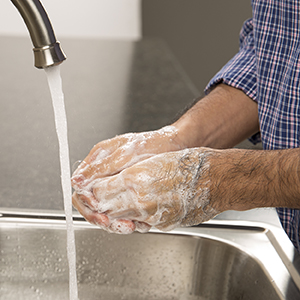An infection is due to harmful germs (bacteria, fungi, or viruses) in the baby’s body. Infections can begin before, during, or after birth. All babies have immune systems that are still developing. This system’s job is to fight germs. A newborn’s immune system may not be ready to fight an infection. Premature babies are at an even higher risk of infection than full-term babies. This is because babies get antibodies (infection-fighting substances) from the birth parent when they are in the uterus. Preemies don’t receive several weeks of antibodies since they are born early.
How are infections diagnosed?
Infection can be found using tests including:
-
Blood tests.
-
Urine tests.
-
Cultures of possibly infected areas.
-
Lumbar puncture (spinal tap).
How can infections be prevented?
You will need to follow some rules while your baby is in the NICU (neonatal intensive care unit). These are to protect your baby and the other babies from infection. Here are some common ways to prevent infection:
-
Wash your hands thoroughly before entering the NICU. Washing your hands well and often is the best way to not pass germs to your baby. Be sure you understand and follow any handwashing directions you are given. You may be told to scrub (wash well with soap and water for several minutes) when you first arrive for a visit. After this first scrub, alcohol-based hand cleansers or a wash with soap and water may be needed if you touch anything that could transfer germs to your hands. If you have more than 1 baby in the NICU, you may be told to wash your hands after touching 1 and before touching another.
-
Restrict the number of people who have contact with your baby. Check with NICU staff about rules for visiting siblings or grandparents.
-
Keep people who are ill out of the NICU. Make sure NICU staff know if you or anyone in your household is sick. If so, you will most likely need to stay out of the NICU until the danger has passed.
-
Keep infants in the NICU away from each other. A baby who has an infection or has been exposed to an infection may be kept away from other babies. The baby may be moved to a special part of the NICU.
-
Disinfect cell phones and other devices. These may carry bacteria. Ask your baby's care team how to disinfect your cell phone and other devices.
How are infections treated?
Medicines are used to treat infections. If the germ causing the infection is known, a medicine that targets that germ can be used. If the germ is not known or if targeted medicines aren’t working, medicines that fight many types of germs may be used.
What are the possible complications?
In most cases, babies get over infections with no lasting harm. But a severe infection can be life-threatening, even with treatment. Whether your baby has any long-term effects on their growth and development depends on the cause of your baby's infection and how your baby responds to treatment.
How to wash your hands
People who have contact with your baby should follow the steps below to wash their hands. Also follow any other directions from NICU staff. If there are other children in the family, you may need to help them wash their hands:
-
Use warm water and plenty of soap to work up a good lather.
-
Clean your whole hand, under your nails, between your fingers, and up your wrists. Don’t just wipe—rub well.
-
Keep washing for at least
20 seconds. You may be surprised by how long this takes, so be sure to count. -
Rinse. Let the water run down your fingertips, not up your wrists.
Featured in


